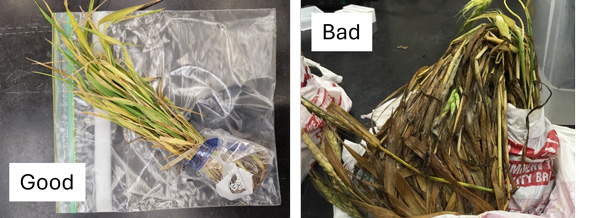On April 1, 2025, the K-State Plant Disease Diagnostic Lab will slightly increase service fees. This adjustment allows us to continue providing quality diagnostic services while continually upgrading our testing technologies.
Table 1. K-State Plant Disease Diagnostic Lab Services and Fees.
|
Diagnostic Service |
Internal Charges (KSRE) |
External Charges |
|
Digital Diagnosis |
$0 |
$0 |
|
Routine Diagnosis (per sample) |
$12 |
$15 |
|
There is no routine diagnosis charge when running the specialized tests listed below. |
||
|
Fescue Endophyte |
$30 |
$40 |
|
Nematode – Soybean Cyst Nematode |
$30 |
$40 |
|
Nematode – Pine Wilt |
$30 |
$40 |
|
ELISA (wheat virus screen-6 pathogens) |
$55 |
$75 |
|
Molecular (first/single pathogen) |
$55 |
$75 |
|
Molecular (each additional pathogen) |
$20 |
$30 |
Wheat viruses (WSMV/TrMV) have been confirmed in western Kansas in the last month, so it is time to be on the lookout for this problem in wheat fields this spring.
The ELISA testing fee has increased to $55 for extension and $75 for non-extension.
The K-State Plant Disease Diagnostic Lab uses ELISA (a protein-based diagnostic test) to screen for wheat viruses. The wheat viruses that we screen for are Wheat Streak Mosaic Virus (WSMV), Triticum mosaic Virus (TriMV), High Plains Wheat Mosaic Virus (HPWMoV), Wheat Spindle Streak Mosaic Virus (WSSMV), Soil-borne Wheat Mosaic Virus (SBWMV), and Barley Yellow Dwarf Virus- PAV (BYDV-PAV).
Sample Submission – High-quality samples lead to high-quality diagnoses
- Collect and ship samples on or before Wednesday to avoid weekend storage.
- Collect healthy and symptomatic plants (labeled).
- Collect the entire plant.
- Dig up the plant to keep the root system intact.
- Bag roots separately to avoid soil contact with leaves.
- Place bagged roots and above-ground materials in a larger plastic bag.
- Label and use plastic bags instead of paper; do NOT add water. This maintains sample integrity.
- Once collected:
- Fill out the submission form with as much information as possible. Include variety/hybrid info (especially for wheat). Attach it to the outside of the sample bag.
- Ship plants ASAP overnight via UPS or FedEx when possible. USPS can take up to 14 days.
- Send plant sample photos to clinic@ksu.edu with the tracking number or date shipped.
- 3 useful types of images (see Figure 1 for an example of a good versus bad sample submission)
- Symptom/problem up close and in focus
- Entire plant from ground level to the top of plant
- Site – capture the pattern in the field, transition areas, terraces, etc.
- 3 useful types of images (see Figure 1 for an example of a good versus bad sample submission)

Figure 1. The photo on the left is an example of a good sample submission. The picture on the right is a poor sample submission.
If you have any questions, comments, or concerns, please contact us via clinic@ksu.edu or 785-532-6176.
Chandler Day, Associate Diagnostician
chandlerday@ksu.edu
Judy O’Mara, Plant Disease Diagnostic Lab – Director
jomara@ksu.edu